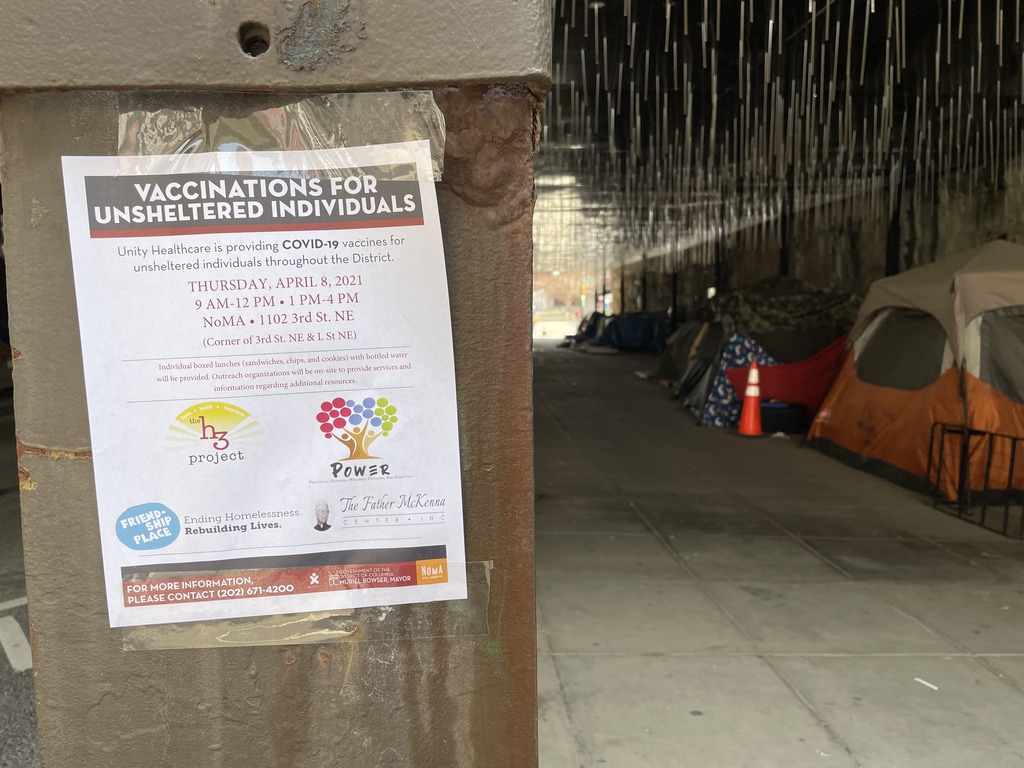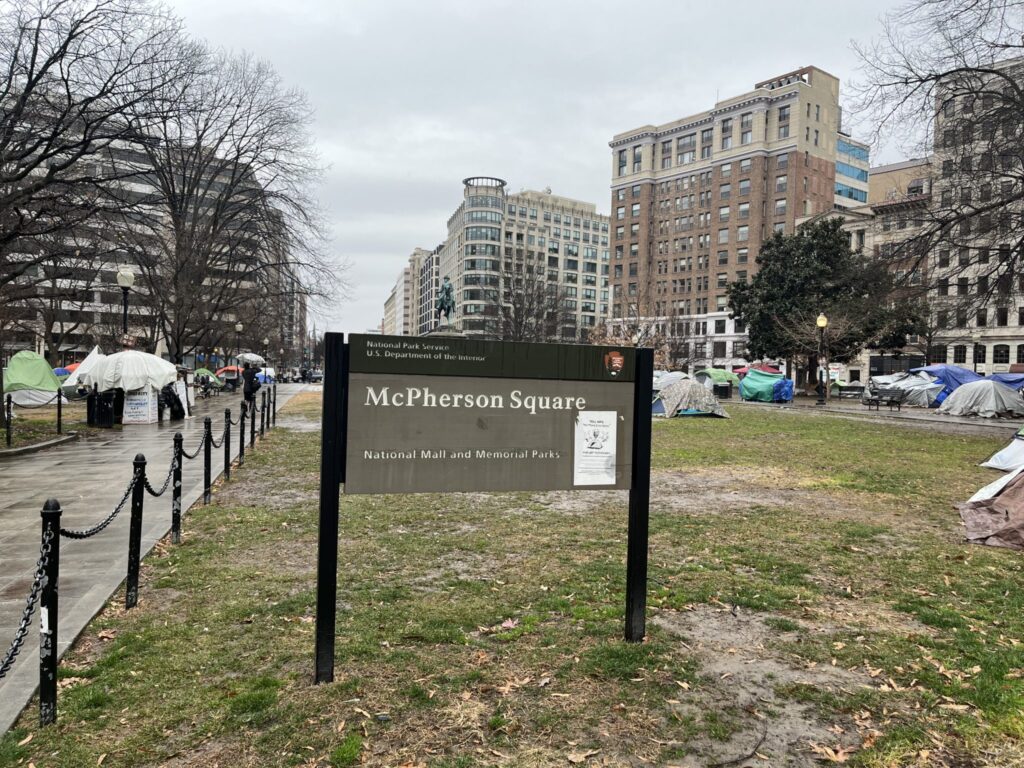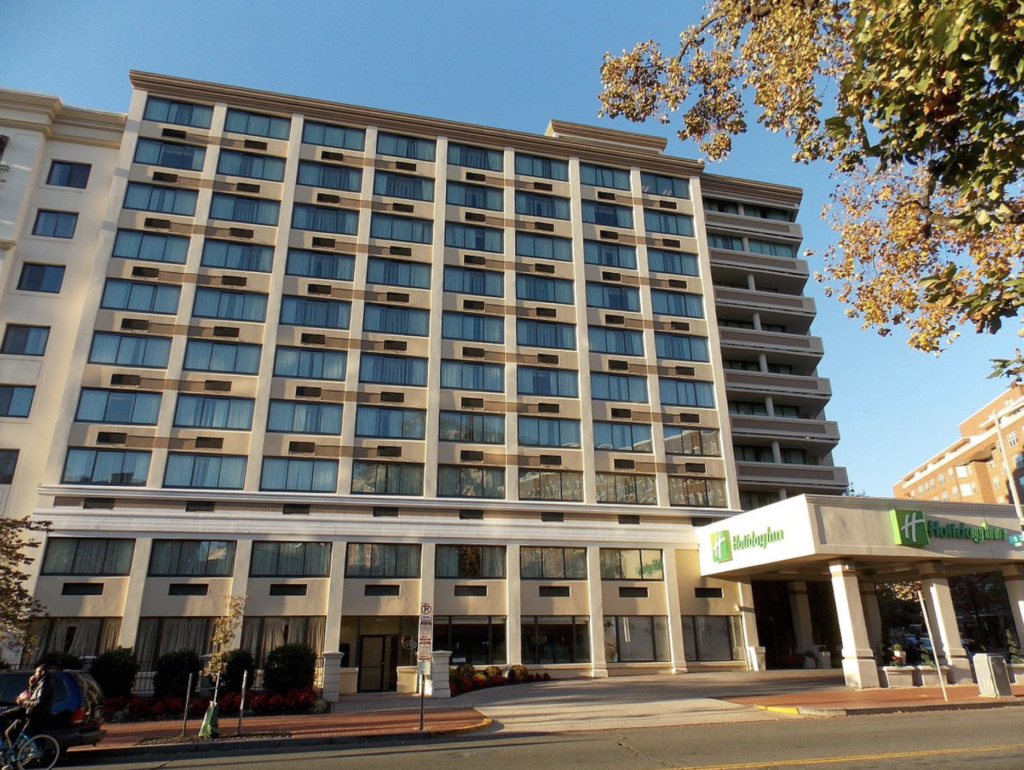Efforts to vaccinate unhoused individuals not in the shelter system in the District have been underway since the end of March, but multiple community advocates have cited incidents of inequity when distributing to marginalized groups.
The D.C. Department of Human Services, partnered with the nonprofit Unity Health Care, hosted pop-up mobile vaccine clinics at multiple locations including Marvin Gaye Park, Miriam’s Kitchen, So Others Might Eat and near the NoMa encampments.
This rollout comes after D.C. distributed COVID-19 vaccines to people experiencing homelessness in low-barrier shelters and at Pandemic Emergency Program for Medically Vulnerable Individuals, or PEP-V, centers in February and March.
Earnest Telfair, an outreach worker with Unity Health Care, said “trust is key” when working with people experiencing homelessness, and he’s encountered a lot of vaccine hesitancy while working on the rollout.
“I understand they got fear, they got mistrust,” Telfair said, who previously experienced homelessness in his 20s and 30s.
Multiple factors contribute to this hesitancy, he said. The recent Johnson and Johnson factory mixup in Baltimore has been cited to him as a reason to not get the vaccine. He’s also heard fears of the vaccine being used on marginalized groups as experimentation.
“They wanna know if the white man is here to kill us all,” Telfair said.
This hesitancy is widespread in the United States. Among people of color, it is in part due to the ongoing medical racism and deeply-rooted past and present white supremacy that condoned and informed medically exploitive acts against Black communities. Among white people, it is in part due to a lack of focus on spreading information and answering questions in more rural communities, and partially due to the spread of misinformation by conservative legislators, faith leaders, and media outlets. A recent NPR/PBS NewsHour/Marist survey found that 28% of white respondents and 25% of Black respondents said they did not plan to get the vaccine.
Telfair has seen less vaccine hesitancy in PEP-V and low-barrier shelters, but more at mobile vaccine clinics. Those outside the shelter system are “less likely to trust the system,” he said.
The single-dose Johnson & Johnson COVID-19 vaccine was used at clinics as available to reduce logistical complications, wrote DHS Program Manager William Kuennen in an email to outreach providers.
Local leaders paused the use of the Johnson & Johnson vaccine on April 13 at the recommendation of the CDC and the FDA due to rare but severe blood clots identified in six out of more than 6 million recipients of the vaccine. The CDC and FDA have since lifted the recommended pause in distributing the Johnson & Johnson vaccine.
Attempts to skip the line
People experiencing homelessness were included alongside grocery store workers and critical government employees in the District’s second priority group for vaccine access, following health care workers. At a mobile clinic on April 2 hosted by So Others Might Eat and meant for unhoused District residents, several housed residents attempted to receive a vaccine, according to a homeless services employee based in the District who asked to remain anonymous for work reasons.
The employee was told by housed residents that an ANC Commissioner told constituents it was a “no questions asked clinic” in an email. Housed residents who came to the clinic were turned away. It is unclear which ANC Commissioner sent the email.
Shannon Clark, a Ph.D. candidate at American University in anthropology and co-founder of Remora House D.C., said she was outraged that an ANC Commissioner encouraged constituents to go to a mobile clinic meant for people experiencing homelessness. But she said she was “unsurprised.”
“I think it would be hard to breach the trust any more than it already is with how housed residents treat their unhoused neighbors,” Clark said.
These vaccine clinics are for UNHOUSED RESIDENTS I do not care what your ANC rep says.
Please let your unhoused friends & neighbors know! pic.twitter.com/qqKKU9eJoE
— Mayor Bowser Hates Unhoused Residents (@shanthropology) April 3, 2021
Maurice Cook, the founder of the nonprofit Serve Your City and lead organizer of Ward 6 Mutual Aid, coordinated with councilmembers, ANC commissioners and local organizations to host a mobile vaccination at Mount Moriah Baptist Church, a historic Black church in Ward 6, on March 26.
“It was designed to address the disparity between the white and Black people — those who have actually died from COVID-19 — and those who have had very little access to COVID-19 vaccinations.”

While the event was targeted at marginalized communities, ANC 6B Commissioner Denise Krepp forwarded the information and flyer to her full constituent email list of about 500 residents after refusing to help organize the event. Krepp said in an interview she chose not to participate because Cook has previously called her racist.
At the event, about 10-15 white residents made appointments at the clinic beforehand, which were honored, Cook said. Other white residents attempted to walk-up and were turned away.
“She was willing to use the historic Black church for her sick sense of equality,” Cook said.
Krepp said it was “news” to her that the event was meant to address racial disparity in the District and intended to serve people of color. In the planning stages, Ward 6 Councilmember Charles Allen told Krepp about the event and noted a flyer would not be sent out to a mass email list, she said.
“And my response was, ‘if this is an event that is for D.C.’s residents, I’m sending it out to everybody,’” said Krepp, who has been an ANC Commissioner for six and a half years. “Because quite frankly, disease doesn’t care what skin color you are. People are getting it regardless of color.”
The flyer was sent to people on the Mount Moriah email list, which Krepp received and forwarded to her constituents. In the newsletter, recipients were encouraged to spread the word — “If you are a D.C. resident, PLEASE register for this event. Please share with your family members, friends also,” the text read.
Cook said the event was a success for the community but that it’s indicative of a larger issue.
“There are structures that are working against the survival and the thriving of Black and brown people,” Cook said. “And we have to fight those structural conditions.”
Between 2000 and 2016, the District had the highest rate of low-income displacement of any major central city in the U.S., according to a University of Minnesota Law School study. Ward 6, which includes Mount Moriah, has undergone some of the most intense gentrification, according to the report.
There were other instances of District residents attempting to receive vaccinations meant for vulnerable populations.
In a press briefing with Mayor Muriel Bowser and D.C. Health Director LaQuandra Nesbitt at the beginning of April, Michael Brice-Saddler of The Washington Post asked on Street Sense Media’s behalf if the District administration observed or heard of these instances. But the mayor’s team only referenced distribution in low-barrier shelters in her response, not mobile clinics.
“I would find it challenging to conceive how individuals who are not already engaged in the system and using low barrier shelters would present to those clinics in any number of significance without raising the concern for that vaccine clinical provider,” Nesbitt said at the briefing.
Unhoused residents cite relief after vaccination
“My experience was lovely. I feel great,” said Raymond, who received his vaccine at the mobile clinic near the NoMa encampments on April 8. “People just have to come get it.”
At the clinic, other resources and services were available like free HIV testing, bags with hygienic items from Sasha Bruce Youthwork, and a complimentary lunch.

Allen Underwood accompanied his friend to the clinic but had already received his vaccine in March because of his veteran status.
“I felt good,” Underwood said. “I’m not scared of it.”
Joe also came with a friend to get his vaccine at the NoMa clinic. He said he was recruited by an outreach worker from Unity Health Care.
“It’s good for you,” Joe said.
The h3 project, a District-based organization supporting people experiencing homelessness and human trafficking, was also present. Ami Angell, the founder and CEO, brought h3 to the clinic to help connect people to housing and other resources.
In comparison to other states, Angell said the District is “leading the charge” when it comes to vaccine distribution to people experiencing homelessness.
“Other people I’ve spoken to are really impressed,” she said. As of April 27, 20% of all people in the District were fully vaccinated. After April 28 there will be no “line” to register for vaccine appointments through D.C. Health. Mayor Bowser announced that 11 new walk-up vaccine sites will open on May 1. You may still schedule appointments with private health providers, including pharmacies.






